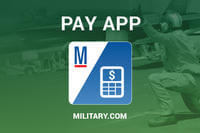In the military, sick call simply means going to see the doctor because you don't feel well. Sick-call hours are usually first thing in the morning, immediately after the breakfast meal.
Warning: You must obtain your instructor's permission before attending sick call.
At sick call, you probably won't see an actual doctor. Instead, you'll likely be attended to by a physician's assistant (PA) or hospital corpsman. If the problem is too tough for the PA to handle or if you need prescription medication, the PA will refer you to an actual physician.
Warning: Do not attempt to fake an illness or injury in order to get out of training. If you go to sick call and they find nothing wrong with you, you can be assured that your instructor will hear about it, and the consequences of malingering will not be pleasant.
Getting Shot (the Medical Kind)
During the first two weeks of basic training, you'll receive more immunizations than you knew existed. The good news is that you don't get all of these shots at one time. Your instructor will march your unit to the shot clinic, where you will receive a few of these shots and then take you back a couple days later for more.
Not long ago, the services used to use high compression air guns for basic training vaccinations. (You know, those neat "phfffft" guns you see on "Star Trek''?) However, the problem with these neat devices is that if you move, they'll cut the heck out of your arm. After a few chopped-up arms, the services went back to the trusty old needle.
Payday!
When you report to basic training, you must have a bank account. If you don't, one will be opened for you at the local on-base bank. The military services are not set up to pay you by cash or check. All pay is made by direct deposit to a bank account. If you don't have a bank account, you can't get paid.
Tip: You won't have available time to pay personal bills during basic training. It's a good idea to establish a bank account before leaving for basic, and then give a trusted loved one access to the account so they can handle those financial matters from home until you return.
In basic training, all recruits are entitled to base pay. In 2010, the base pay rate for an E-1 is $1,447.20 per month. (That figure has gone up to slightly more than $1,600 per month in 2020.) You will receive one half of that amount in each bimonthly paycheck.
If you have dependents (spouse/children), you also will receive a housing allowance, which is designed to provide a household for your dependents. The housing allowance amount depends on the location where your dependents live.
From Basic Training for Dummies, copyright © 2011 by Wiley Publishing, Inc., Hoboken, New Jersey. Used by arrangement with John Wiley & Sons, Inc.
Interested in Joining the Military?
We can put you in touch with recruiters from the different military branches. Learn about the benefits of serving your country, paying for school, military career paths and more: sign up now and hear from a recruiter near you.















